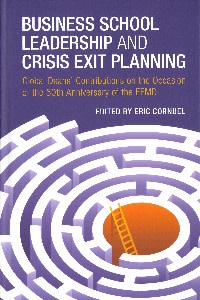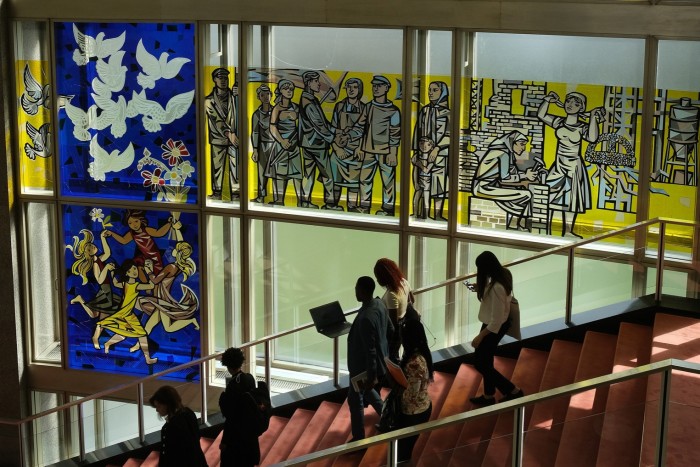Tough lessons for business school deans

Roula Khalaf, Editor of the FT, selects her favourite stories in this weekly newsletter.
Business School Leadership and Crisis Exit Planning: Global Deans’ Contributions on the Occasion of the 50th Anniversary of the EFMD, edited by Eric Cornuel, Cambridge University Press
The effects of the Covid-19 pandemic hit Jean-François Manzoni hard. IMD, the Swiss business school he leads, is particularly dependent on fees from executive education — short, non-degree courses. These were squeezed sharply as his international corporate clients postponed or cancelled as they went into lockdown and tightened budgets to adjust to the uncertain times of 2020-21.
Reflecting on how he coped, Manzoni writes with a certain understatement: “I experienced a very interesting case of ‘theory meets practice’.” He describes the importance of a management style that is engaged and aligned with staff, and concedes he sometimes withdrew too far from colleagues with whom he disagreed.
Manzoni highlights the importance of regular communication with his team; and of “offensive” actions to invest in innovation, despite the pressures to take a more defensive stance. He also singles out the need for managers to look after themselves during a crisis, through exercise, nutrition and sleep, as well as by showing gratitude and compassion to offset the inevitable periodic anger, grief, fear and frustration they experience.

Manzoni’s frank reflections are one of the stronger chapters in a recent collection of essays by business school leaders on responses to the pandemic, humanising wider management thinking by drawing on personal decisions.
This is primarily a specialist book for deans, while providing some broader insights into the evolving culture of business schools themselves. At times, it feels like a form of group psychotherapy; at others, a primer of responses, a few of which seem a little self-indulgent, introspective, overly detailed or banal.
It was written partly to commemorate the half century since the creation of the European Foundation for Management Development (EFMD), which now has nearly 1,000 members and oversees a highly regarded accreditation process for schools around the world.
European Business Schools Ranking of 2022

See which schools reached our league table of 95 course providers. Plus, read the rest of our coverage here.
The book seeks to explore how Covid accelerated or instigated significant change — something Peter Tufano, former head of Oxford’s Saïd Business School, compares with evolutions of five leading US institutions during the second world war. Some took a transformational approach to leadership and were able to bring about significant long-term change.
As Eric Cornuel, EFMD’s president, concedes, there is a danger that the views in this book already seem out of date, as circumstances have changed and the pandemic has seemingly begun to fade — if only because of subsequent developments, not least surging inflation, rising energy prices and food insecurity, driven in part by Russia’s war in Ukraine.
Indeed, while the Sars-Cov-2 virus may still be widely circulating, it has since been overshadowed by the fallout from the gratuitous loss of human life, physical disruption and political destabilisation of the post-cold war settlement triggered by Vladimir Putin.
The chapter by Valery Katkalo, dean of the Graduate School of Business of Moscow’s Higher School of Economics, reads like a painful historical relic, with the strong reputation of the institution he charts since undermined. Academics there and elsewhere in Russia have pledged loyalty to the Kremlin or been dismissed or fled abroad, and corporate clients and prospective students can be hesitant to attend.
Elsewhere, Yuan Ding, head of the pioneering China Europe International Business School (Ceibs) in Shanghai — itself partly founded and backed by EFMD — alludes to his country’s lockdowns and the restrictions that have been imposed on travel and classes.
But he also cites António Guterres, the UN secretary-general, on the transformational forces of “climate change, the mistrust of leaders, increased geopolitical tensions and the dark side of the technological revolution”.
The more aggressive and repressive actions by Putin and his Chinese counterpart Xi Jinping — not to mention India’s prime minister Narendra Modi, whose policies are not described in a chapter on the Indian School of Business — are part of the wider forces reshaping business education.
Many of the authors in the book share a common view on the need for business schools to adapt and embrace sustainability, social justice and stakeholder capitalism. Some call for a more explicit embrace of “fuzzy” humanitarian training alongside “techie” hard skills. Others are frustrated that more is not being done by their own colleagues to bring about change — or by businesses in pushing for change by shifting their recruitment practices.
Several of the contributors also express concern about the gulf between academia and business, with too much focus on abstract theoretical publications that are insufficiently relevant, applied or focused on societal issues. There was also, they say, an absence of output that would have been of value to decision makers during the pandemic.
Ironically, for a group of deans largely writing about their own institutions, the book lacks a strong analytical thread exploring which schools emerged from Covid-19 in better shape or whether there were any common approaches in different regions of the world, not least in EFMD’s historical base in Europe.
While employers and regulators need to do more to press for reforms, the message is perhaps first to each business school: heal thyself.
Comments